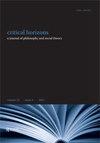Barricades: Between Resistance and Revolution
IF 0.4
Q3 SOCIAL SCIENCES, INTERDISCIPLINARY
引用次数: 0
Abstract
ABSTRACT In a reflection on his Marxist past, J. F. Lyotard described a différend between himself and the revolutionary discourse. This might also represent the relations between the latter and the contemporary discourse of resistance, with its characteristic fascination with non-teleological political action. The disdain for teleology apparently justifies the incommensurability of these discourses, thus disabling any inheritance of elements of the revolutionary tradition. This essay challenges the unbridgeable nature of this gap and explores alternative relations between the two discourses, such as mimetic ones, by reading Walter Benjamin's somewhat neglected fragments on barricades in his Arcades Project. Benjamin's concept of interruption – celebrated by contemporary theorists of resistance – alongside his non-teleological concept of revolution, provides the theoretical armature for this task. Thus, I use barricades, commonly conceived as the emblem of the revolutionary tradition, in order to reconsider the possibility of inheriting aspects of this tradition in times in which the predominant discourse is that of resistance.路障:在抵抗和革命之间
利奥塔在反思自己的马克思主义生涯时,描述了自己与革命话语之间的一种差异。这也可能代表了后者与当代抵抗话语之间的关系,其特征是对非目的论政治行动的迷恋。对目的论的蔑视显然证明了这些话语的不可通约性,从而使革命传统的任何元素的继承失效。这篇文章挑战了这一鸿沟不可逾越的本质,并通过阅读沃尔特·本雅明在他的拱廊计划中有些被忽视的关于街垒的片段,探索了两种话语之间的替代关系,比如模仿关系。本雅明的中断概念——受到当代抵抗理论家的推崇——与他的非目的论革命概念一起,为这项任务提供了理论框架。因此,我使用通常被认为是革命传统象征的街垒,是为了重新考虑在以抵抗为主导话语的时代继承这一传统各个方面的可能性。
本文章由计算机程序翻译,如有差异,请以英文原文为准。
求助全文
约1分钟内获得全文
求助全文

 求助内容:
求助内容: 应助结果提醒方式:
应助结果提醒方式:


